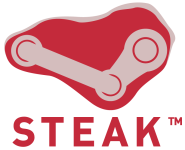Previews of Team Fortress 2 and Left 4 Dead reveal that Steam’s in-development matchmaking service will include persistent “achievements” in the vein of Xbox Live and Games For Windows Live, along with the new concepts of lower-order “awards” and troll-shaming “demerits”. Valve don’t have a collective name yet, so I’m calling them badges.
Left 4 Dead 411‘s excellent preview dedicates an entire page to the new system, explaining how it works to provide both real-time feedback and scoreboard summaries. As can be expected, the game’s badges encourage co-operation between Survivor players:
There are three kinds of awards: Achievements, which include difficult goals like surviving a map without dying; Awards, which are good things you do, such as reviving a teammate, giving away a health kit to someone in need, and saving someone from a zombie about to attack them from behind; and Demerits/Faults, which are bad things which include blowing up a Boomer near teammates, friendly fire, angering the Witch, and jumping in front of someone else’s bullets (reckless). There are a ton of these achievements, ranging from being an Expert Headhunter to completing an entire campaign without using the flashlight at all.
From what we hear in IGN’s Team Fortress 2 interview however, its badges are more personal. This may be because we haven’t heard about the teamplay ones, or perhaps because it’s harder for a computer to accurately detect its particular brand of teamwork. Either way, personal bests will pay a prominent part:
We do a huge amount of stat gathering, like the thing [IGN] saw with the persistent stats stuff, where the game is identifying how well you’re doing and rewarding you for it saying “hey check it out! On that run where you thought you did well, guess what? You did well, you broke this record!” So we gather all that data and use it for game tuning. Steam does that for us for free.
The Achievement game
Badges clearly owe much to Xbox Live’s Achievements, Games For Windows Live will be a competitor to Steam’s online gaming service mechanisms, and (if you read the previews in full) Valve are making a concerted push to build more accessible online games. These are not unrelated facts.
Live is a success for many reasons, and Achievements are a large one. It’s fun to play games on the Xbox 360, but each purchase, at retail or from Live Arcade, is a macro-transaction (to mangle a phrase) in the social, gotta-earn-them-all Achievement meta-game. It’s Microsoft brand social glue, working in a similar way to MySpace and other such sites: you do something, then talk about it among your friends, by way if you so desire of your summarised Gamercard. The easter egg nature of many Achievements makes finding your trophies all the more fun, and the expansion of gold farmers into Gamerscore padding should give some indication of how much store people place in their record.
I’ve had a hunch that Valve would be gearing Steam up to better compete with GFWL for some time now. Badges aren’t conclusive evidence that Steam is being repositioned, but it’s fair to say that it would be a waste for them to be used strictly for ranking players and votekicking. The biggest challenge is redistributing the data widely and in a way understandable to the average user; and to compound things, Microsoft have set the bar very high.
No matter how much talent is thrown at them however (Valve have been and are still hiring web application developers and user experience designers), badges are facing the fact that the potential for their social use is limited by Steam’s paucity of the core games that would be needed to keep them fresh and relevant.





